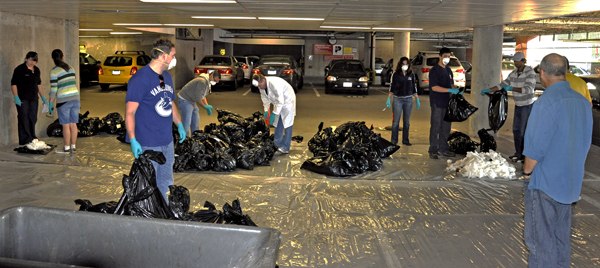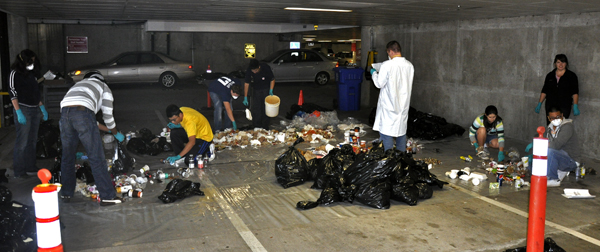High hopes for this year’s garbage audit
November 16, 2010 by Stu Gallacher
Environmental students have been sifting through piles of garbage from the Richmond campus to gather vital information about the school’s disposal system.
On Oct. 19, environmental protection technology students began conducting aa two-day garbage audit in order to determine whether it would be beneficial to start a composting program.
“We’re trying to get an idea of how much garbage Kwantlen is producing and where it’s coming from. Once we can quantify all of it, we’ll try to make some suggestions of what to do with it: whether it would be worth it to have our own composting facility or just participate in Richmond’s composting program,” says Mike Ferko, who’s in charge of the audit.
“We collected garbage from various sites, such as the hallways, the washrooms, the cafeteria and outside. We weighed it, compared it and we’re analyzing the results so we can write a report about it,” says Neil Brooks, a second-year student and first-time participant of the audit.
“UBC has a huge composting facility, and we’re trying to draw some comparisons between us and them to see if it’s feasible. They have a huge horticulture program, so they produce a lot more waste than we do,” says Ferko.
“In the cafeteria and kitchens, there were a lot of things that we found that could be composted or recycled,” says Brooks.
Ferko agrees that most of the garbage is cafeteria waste and is able to be composted. “There’s just too much recycling thrown in the garbage.”
Ferko says that saving money on garbage removal would be a major benefit of a successful composting program.
“It cost money to send waste to the landfill. Composting is basically taking nutrients from your food, your banana peels and such, and breaking them down into soil so plants can use them again. But you’re not supposed to compost meat because you’ll attract pests and rats and raccoons,” says Ferko.
“The experience itself was pretty gross. I was digging through trash from the cafeteria that must have been three days old, just sitting in a room in garbage bags. So the actual experience, I’m not going to rush back to do it again,” says John Currie, a second-year student also participating for the first time in the audit.
Currie says that it’s important for industries to make and use products that can be recycled, instead of wrapping everything in a bunch of non-recyclable plastic. “We want the producers to think about how they can help…to help change the system from the ground up.”





Comments
Feel free to leave a comment...
For details on how we handle comments, select "Our Comment Policy" from the "About" drop-down menu at the top of the page.
Note: All comments are moderated and must be approved before they are published.